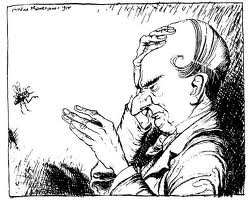A fly bit the bare head of a Bald Man, who, endeavoring to destroy it, gave himself a heavy slap. Escaping, the Fly said Mockingly, “You who have wished to revenge, even with death, the Prick of a tiny insect, see what you have done to yourself to add insult to injury?” The Bald Man replied, “I can easily make peace with myself, because I know there was no intention to hurt. But you, an ill-favoured and contemptible insect who delights in sucking human blood, I wish that I could have killed you even if I had incurred a heavier penalty.”
I only recently came across this fable, but the moral it teaches [Revenge will hurt the avenger], I learned many years ago from my own dad. I was working for him as an electrician’s helper. He submitted an estimate for a job to wire a new house for a man that we both new. My dad’s estimate was accepted and we began the work. As we were doing the finish stage of the job, the owner asked that we purchase and install light fixtures that were considerably more expensive than the ones that my dad’s bid was based on. Because he knew the man, dad didn’t ask the owner to sign a new estimate, indicating he would pay for the extra cost. When the job was finished, my dad sent the owner a bill that included the extra expense for the light fixtures, but the guy refused to pay the extra amount. I got quite angry and told my dad that I wanted to go back to the house and exchange the more expensive lights for the cheaper ones. He wouldn’t let me. In reference to the man having cheated him, dad said, “It’s hurting him more than it’s hurting me.”
I think what dad meant was that while he would he would lose money as a result of the man’s dishonesty, he wasn’t going to lose sleep over it. He certainly wasn’t going to sue the man and go through all of that hassle, especially considering that course of action would cost him even more in time and money. Had he decided to sue the man or let me go back to the house and exchange the fixtures, he would have been like the man in the fable who wished that he could have killed the fly even if he had incurred a heavier penalty. In other words, he might have gotten some satisfaction through his revenge, but he would have paid a price for that revenge. He would have had to pay a lawyer, possibly some court fees and perhaps been sued himself. He also would have lost income because of spending time in court instead of working.
The other thing that my dad meant was that the man who had cheated him would be hurt the most because his dishonesty would hurt his reputation, and more than that, it would be on his conscience. His guilt would continue to bother him and most likely, at least for a while, every time he turned on the lights in his house or saw my dad at the store or at church, he would feel a twinge of guilt.
God warns us against taking revenge in His word. In Leviticus 19:18 we read, “Do not seek revenge or bear a grudge against one of your people, but love your neighbor as yourself. I am the Lord.” God wants us to return good for evil, not evil for evil.
The fact of the matter is that revenge is God’s prerogative, not ours. Romans 12:19 says, “Do not take revenge, my friends, but leave room for God’s wrath, for it is written: “It is mine to avenge; I will repay,” says the Lord.” If vengeance is called for, God is more than able to deliver. He doesn’t need you or me or anyone else to make deliveries for Him.

